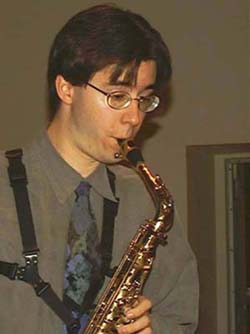Hitting all the right notes
By Christine Marcotte
cmarcott@julian.uwo.ca
 |
| Photo by Christine Marcotte |
| Ryan Fraser was in the recording studio last Wednesday. |
But what stands out the most about Fraser is his age. "Because of my level of success, most people comment on the fact that I look young, but most assume that I am 30, maybe 35."
Being young has been both positive and negative, Fraser says. "I'm at an awkward age for musicians. If you're 16 or lower, and you're cute and you can play pretty well, they consider you a child prodigy. If you're in the 18 to 30 range, they consider that you're too young to know anything, even if you were a child prodigy, and after that, your career starts again. That's a hard thing to battle with sometimes."
But he says he is an exception to this. "I don't have a problem once people hear what I do or get a chance to interact with me," he says. "I might be young, but I can be quite intimidating at six foot four," he jokes.
His talent is even more surprising when considering that he is the first in his family, alongside his sister, to show significant talent in music. "My grandfather use to make violins in Czechoslovakia and my great-uncle by marriage was an amateur musician, but that's the total and utter extent of musical ability and talent in my family."
Jumping into a career in music was therefore a decision Fraser made carefully, especially considering the fact that funding to the arts is being cut drastically. But his love for music prevailed, although it has not necessarily been easy.
"One of the difficulties in this field is that you go into music because you love it, because it's what you do to get away from your day-to-day stress. But now, all of a sudden, all your stress is associated to music." Although he does not regret his decision to make music his career, he does admit that it is a problem with which he sees many of his students struggling.
"Before I had him as a teacher, I felt so depressed and frustrated about my playing," says Natalka Rozeluk, a fourth-year saxophone student studying with Fraser. "I would practise things over and over, and it was like hitting my head against the wall. I didn't want to play anymore."
"Professor Fraser rebuilt my technique from scratch. He not only rebuilt my technique but he has such a passion for the instrument that he has instilled this passion in me.
Fraser is passionate about numerous topics, from chemistry to physics, computers to psychology. "When I went to university, at the age of 17, I hesitated between music, business and physics," he says. Today, he has incorporated all of these fields into his work -- the business because he is self managed, physics because he uses it to teach music to his students. He has also chosen to merge his love for computers and music together by incorporating digital technology into his music.
But Fraser did not get to this point alone. He has had many influences and mentors, one of whom was Donald Sinta, a world-renowned saxophone player and teacher currently working at the University of Michigan. "A year with that man is like 30 years with anybody else. You come out of there a changed man," Fraser says.
It was under his supervision that Fraser learned the most about his own music and about the influence that teachers can have with young artists. "I'm not sure that some of these people know how much they influence," Fraser says.
This encouraged Fraser to also want to teach.
"My first job is as an educator. As far as I'm concerned, every performer's first job should be as an educator," Fraser says.
But Fraser's opinion of what constitutes teaching is very different from the norm. "I can't teach my students anything," he says. "All I can do is give them the tools to learn by themselves. If the only thing they know after they leave university is what I've taught them, when they go out into the real world, they will die. On the other hand, if what I've taught them is to teach themselves, they can leave here and learn 15,000 times what I've taught them."
Fraser learned this through Sinta and the admiration he describes for his teacher is mirrored in the admiration his own students have for him. "He is definitely one of the best teachers I've ever had," Rozeluk says. "The first time I met him was four years ago when I was auditioning for music here at Western and he was a fourth-year student. He played and he absolutely blew me away ... Now I get to work with him."
Fraser has received nothing but positive feedback from audiences in recent years. "He has great stage presence," says Rozeluk. "He's very confident on stage, he interacts with the audience, he cracks jokes and he tries to make them understand his music. Overall, he has a lot of charisma."
But Fraser's success did not come overnight. It took many years of 14- to 16-hour days to get to this point. But today he enjoys the career of a typical 30-something professional.
So is there anything that gives away the fact that he is only 25?
"I have a horrible addiction to video games," he says.
